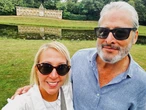Masayoshi Son is back on top. On January 22, President Donald Trump announced a joint venture from Son’s investment holding company, SoftBank, along with OpenAI and Oracle, to invest billions of dollars in AI infrastructure projects in the U.S. The project, called Stargate, will be chaired by Son. SoftBank is now reported close to finalizing a $40 billion investment in OpenAI at a $260 billion valuation.
The news is all the more remarkable for the fact that just three years ago, SoftBank’s venture firm was crumbling following disastrous investments in the likes of WeWork, Wag, and Zume. SoftBank turned things around in 2023 with the successful IPO of Arm, in which it has a controlling stake, and Son—once the most powerful person in Silicon Valley—is riding high again.
For the Most Innovative Companies podcast, we spoke with former Financial Times editor Lionel Barber about his new book Gambling Man: The Wild Ride of Japan’s Masayoshi Son. Here, he talks about Son’s relationships with Elon Musk, Donald Trump, and Steve Jobs, his AI ambitions, and how he got it so wrong with WeWork.
Your book came out the day the Stargate deal was announced. After the announcement, Elon Musk claimed on X that SoftBank and OpenAI didn’t have the $500 billion they planned to invest. What did you think of that?
Elon is wrong. The fact is, Masa does have the money—we are talking $500 billion over four years. He’s got $40 billion [in cash] on the balance sheet. He’s got some assets that he could sell. He’s got stakes in T-Mobile. He’s got stakes in 500 companies. And he’s also got partners like Sam Altman of OpenAI and [Oracle cofounder] Larry Ellison, who’s worth [around] $230 billion. I think he’s going to have some debt in there as well—maybe half, maybe 40%? So he’s well on the way to $500 billion. It’s real.
There’s been a lot of talk about a rivalry between Elon Musk and Sam Altman. Does Elon Musk have any relationship with Son?
No, he doesn’t. They did have a meeting around 2017 where Elon [was] thinking about going private and Masa [saw] an opportunity, as he often does. They did have talks, but I think what happened, as so often is the case when it comes to multi-billionaires, is there was a bit of an ego clash as well as a discussion about terms.
You’ve got a great story in your book about the initial meeting between Trump and Son in 2016.
They had this meeting where Trump hears that Masa is ready to create 50,000 jobs and invest $50 billion in the U.S. economy. And Trump already wants to tweet this out in real time; the meeting doesn’t last very long. Trump retires to his bathroom, straightens his tie, and then combs his hair in a particular meticulous fashion. Then he looks at Masa and says, “Look, it’s the little things that matter, so this is the way to comb your hair.” He forgot, of course, that Masa is, shall we say, follicly challenged. He doesn’t have a lot of hair. So, there is a surreal moment of billionaire meets billionaire, one with more hair than the other.
What do the two men think of each other?
They’re both very transactional. Both of them are natural dealmakers, always looking to gain the edge. Therefore, there’s a sort of meeting of minds. Masa is very good at spotting where there’s a likely convergence of interests. When Masa got close to Trump back in 2016, he thought, I want to merge Sprint with T-Mobile. I’m being blocked by those Obama administration people, so maybe I’m going to get a better deal. Now with Trump 2.0, every billionaire in America wants to get close to Trump.
What was it like to report the book? Son is famously difficult to pin down.
He is a very secretive, private man. He’s very difficult to get to. His travel schedule is always up in the air. He sort of makes it up as he goes along. I decided to do a lot of reporting first before asking for the interview. And I did go to Tokyo twice and was told he was too busy. I decided to leverage my contacts, particularly in America, and go to Silicon Valley, go to Stanford Business School, learn a bit more about venture capital and work those contacts. [I went to] the Sun Valley conference where there were a lot of people who knew Masa. So I had quite a bit of reporting before going there.
The second big obstacle was cultural. I don’t speak Japanese. Getting Japanese people to talk is not easy. So, you needed introductions. I found a researcher who was Korean-Japanese, which was very important for helping me understand both the language, translating Japanese manuscripts and texts. The third obvious problem was that you need quite a lot of money to travel around the world.
Can you talk about Son’s early life? He became a billionaire without the support of venture capital, private equity, or the capital markets. He came from nothing.
His father left school at 14. It’s after the second World War. Japan is devastated, and he’s selling liquor illegally in a Korean-Japanese slum in Kyushu, the western island in Japan. [His family is of Korean heritage.] Then he goes into pig breeding, which is quite a lucrative business in post-war Japan, then loan sharking, then Pachinko, which is slot machine gambling and really part of the underworld economy in Japan.
So, Masa comes from that slightly dark side, and he’s got a hustling instinct. But then he does a crucial thing, which is to leave Japan at age 16 and go to America. He spends seven years being educated in high school and then college at Berkeley before he goes back to Japan.
So he’s the outsider who speaks English. He can be the middleman. And he marshals all these things to make it as an entrepreneur in Japan. He’s a self-starter. He began with nothing. He created a software distribution business, then became this multi-billionaire—kind of a Forrest Gump character who’s around every time there’s a sort of big tech transformation.
In the book, you talk about how many of Son’s own countrymen had an almost dismissive view of him, despite his wealth and success. Is that still the case today?
Son is an object of suspicion still in corporate Japan—and envy, because he is the richest man in Japan alongside Uniqlo’s Tadashi Yanai, who was on the board of SoftBank for nearly 20 years. He’s also an object of suspicion because he doesn’t actually make anything. He’s sort of a financial engineer and middleman. Also, he’s Korean-Japanese. And the fact is, there is still endemic prejudice by Japanese against Koreans.
Son is known for making gigantic investments. He offered Yahoo! cofounder Jerry Yang $100 million in 1995, when Yang wasn’t seeking it. More recently, he gave WeWork cofounder Adam Neumann more than $16 billion. What drives him to make these outsize bets?
He’s a master of destabilization as a negotiating technique. So, [he] kind of comes up with a huge number, and then if you don’t accept it, he says, “Take it or I’ll kill you.” He says, “If you don’t take it, what’s your greatest competitor? We’ll put the money there.”
One of my favorite moments is when he’s trying to hire Nikesh Arora from Google. They’re negotiating the contract and the money, the remuneration package on a napkin, and he puts these huge numbers with [a lot of] zeros. That’s what he does. It’s a theatrical flourish.
Lastly, Son sort of says, “I’m going to be bigger than you ever imagined and I’m going to say things that are so outrageous that you kind of almost feel the fear of missing out.” He plays on that, and he did it very effectively when he was raising tens of billions in the Gulf, and he got the Saudi Crown Prince Mohammed bin Salman to hand over $45 billion.
You finally did get to interview Son. What is he like on a personal level?
Much quieter and less theatrical. Much more reflective. I think he really wanted me to understand or try and appreciate him as a historical figure. He has a great deep sense of history and he thinks of himself as an empire builder like Napoleon and Genghis Khan and Emperor Chin who built the Great Wall of China. This is the kind of scale and context that he thinks about. He is also a slightly sad character. I thought that this is a man who never is quite fulfilled. I describe him not as Icarus overreaching, but more like Sisyphus pushing this boulder up the hill, and then it’s somehow always incomplete. This is why this next AI act is so important for him.
He also operates on centuries-long time horizons. He’s claimed that he’s going to live to 120. Is that just bluster or does he actually believe in this kind of long-range planning?
It has more than an element of seriousness to it. What he’s trying to convey to investors and his workforce is that we have to think about the future [and have a] longer-term perspective. Now, when you hear 300 years, you and I kind of go, what? But as I explain in the book, some Japanese companies literally do go back several hundred years.
On the plus side, you could say that insight helped him understand the sweep of technological innovation that we’ve seen since the launch of the microchip. He’s ridden that wave. On the other hand, when you look at some of his trading, [it’s] not exactly 300-year stuff. He clearly traded out of Nvidia in 2018, and missed out big time. But he kept Alibaba stock all that time and turned a $100 million bet into $120 billion.
Speaking of Alibaba, at one point you quote Son saying that Jack Ma had this “animal smell.” Who are the kinds of entrepreneurs that Son finds himself attracted to?
He’s susceptible to founder’s syndrome. So, people who talk big like he does, he’s a bit of a sucker for that. He’s an empire builder. He thinks on a grand scale, and that’s what puts him in a special category. And it’s why he elevates people who think and talk the same language. Obviously sometimes you’re going to miss badly.
Who are the employees he wants to hire within SoftBank?
With people around him, [it’s like], he’s married one day and divorced the next. Succession is still an issue. But you have to distinguish between hired guns— Rajeev Misra, the ex-Deutsche Banker who ran the SoftBank Vision Fund comes into that category, and Marcelo Claure, [former CEO of SoftBank Group International]—from this loyal cadre of people in Japan. These Japanese executives are paid a lot less than these grand mercenaries. I put them in a different category.
What can you say about Son’s current succession plan?
An executive asked him about that and he said, “I don’t have any sons.” And the executive looked at him and thought to himself, well, you do have two daughters. So, that tells you something. It’s not going to be in the family.
I think he’ll be carried out in a box. And what happens to SoftBank? I mean, the question is, does it get broken up?
Son’s been talking about AI for decades. When did he first get interested in it?
Around the turn of the century. I can’t establish whether he actually read Ray Kurzweil’s book about the singularity, but I certainly know he heard about it. The fascinating thing is, although [Son] talked about the singularity, he didn’t actually invest in a serious and systematic way in deep AI for quite some time. And he kind of missed Sam Altman’s OpenAI. That was partly because of the distraction of the Vision Fund, when he had a $100 billion to spend. He lost a bit of focus.
What kind of AI companies is he interested in investing in?
All he talks about is artificial general intelligence or artificial super intelligence. You have to take this more seriously now. He’s invested a lot in the robotics area and he’s talking about really investing in the infrastructure around artificial intelligence, which means energy and large language model training. He’s got energy assets and he’s got the kind of design expertise with Arm. I think he’s serious about developing a superchip to rival Nvidia.
I’m not going to ask you what we’ll see from SoftBank 300 years from now, but what can we expect in the next five years?
Stargate is real. I think you’ve only seen chapter one in maybe act one, four acts. We’re going to see more detail about the energy side. We’re going to see more about the super chip. We’re going to hear a lot more about Arm and its central role in this venture. And then I think you’ll hear a bit more about the portfolio. He may sell, by the way: He’s got stakes in 500 companies. I think he’s going to sell down to raise cash partly for this. And then you may see some IPO business. And overall I predict we’ll have the rehabilitation of Masa Son, the man that everybody was willing to write off in 2022. It will be his fifth comeback from the dead.









No comments